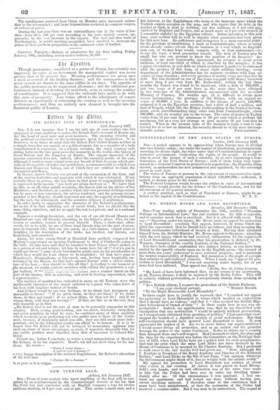Sin—I do not imagine that I am the only one
of your readers who feel surprised at your omitting to notice Sir Robert Peel's account of Russia under the head of good taste and good manners. The amusing vivacity and the political eccentricity of the performance speak for themselves. It is, however, to be borne in mind that Sir Robert Peel visited Russia neither as a simple traveller nor merely as a political agent, but as a member of a body commissioned to represent,on a solemn occasion., the royal courtesy subsisting between the two most powerful monarehs in the world—the Queen of Great Britain and the Emperor of Russia. The august character of the persons concerned does not, indeed, affect the essential merits of the case, although it renders more conspicuous any breach of that decorum which prevails in the republic of ladies and gentlemen ; a commonwealth to which even Queens and Emperors belong, and of which they are entitled to claim the recognized privileges.
In theory, Queen Victoria was present at the coronation of the Czar, and at the various festivities and pageants with which it was celebrated. If not actually there in person, she was there in that sense of responsibility which is expressed in the maxim " qui tacit per alium facit per se.' We know that on this, as on all other public occasions, the Queen acts on the advice of her Ministers ; and, therefore, in a matter where her own personal feelings cannot but be more or less concerned, the advice tendered, and the persons recommended to her Majesty, should represent not only the sagacity of politicians, but the tact, the refinement, and the sensitive delicacy of gentlemen. In order justly to appreciate the character of Sir Robert's performance, let us try it by that unfailing test of social truth, how we should like the same thing ourselves, and let us apply the test to a private and to a national example.
Suppose a wedding-breakfast, and the son of our old friend (Russia and England are very old friends) attending in his father's place, who, for one reason or another, cannot be present himself. Then, a short time afterwards, let us be told, by one of those kind friends who act the part of newsmen in domestic life, that our late guest, at a club-dinner, caused roars of laughter by his description of the bride, her brother, our friends, our household, and ourselves.
Again, let some young Orloff or Demidoff have publicly compared her Majesty's appearance on opening Parliament to that of Cinderella going to the boll; let him have said that he laughed to hear Prince Albert spoken of as a patron of art and letters ; let him by name have hit off (" il n'y a clue la write qui bless° ") some of our best-known public men in the peculiarities of which they would the least choose to be reminded ; let him have gone to Manchester, Birmingham, or Liverpool, and, having been hospitably entertained by the Mayor, let him have amused Europe with a clever caricature of Ids host ;—how should we like all this ? According to our humour at „the moment, we might content ourselves with calling the perpetrator a vul gar buffoon, Pr we Imo a srurnea insult on the . part of his master, first in selecting, and next in leaving unpunished, such a representative. The instinct of mankind has embodied in many an old Eastern story the ineffaceable character of the insult inflicted by a guest who takes leave of his host with laughter instead of thanks. And if these would he our own feelings, do we think that foreigners are insensible to them ? " If we prick them_, do they not bleed ? if we tickle them, do they not laugh ? if we poison them, do they not die ? and if we wrong them, will they not revenge ? " If they are like us in thereat, they will resemble us in that.
Sir Robert Peel is not the sort of man to be generally unpopular in this country. Rich, young, good-looking, not too strict, fearlessly outspoken, and never pointless in what he says, he combines many of those qualities which reconcile us in preferring our own 'public men to those of the Conti
nent, because, if frequently much less able, they are still much more inde
i pendent, and n the influential grades can afford to be honest. It is to be hoped that Sir Robert will not be betrayed by momentary applause into such an abuse of those advantages, as must, if repeated, disquahfy him for any public position more dignified than that of successor to Colonel Sibthorp. Permit me, before I conclude, to notice a cruel misquotation of Hood by Sir Robert, or by his reporters. Hood's wit did. not need slang for its medium. Re wrote
" There I stood alone— A nation and a dummy !"
a very happy description of the isolated Englishman. Sir Robert's alteration of the text into
"Yation like a dummy "
is as poor as it is vulgar. SetuARETor.s.


























 Previous page
Previous page